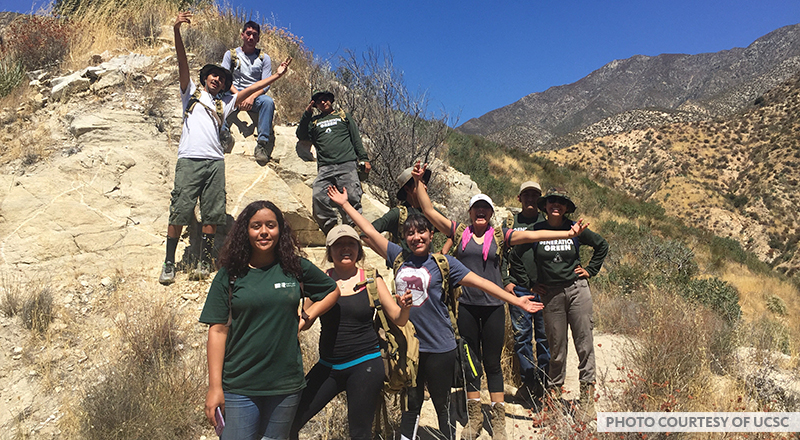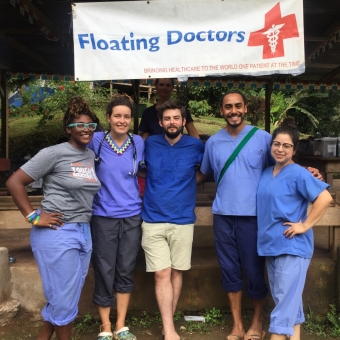UC Global Health Institute recognizes our long standing commitment to health justice. Read the full article below.
Community engagement principles apply to global health
March 6, 2019
At UC Santa Cruz, there’s no shortage of highly motivated young people who want to do worldly good.
The campus’ 50-year-old Community Studies Program helps channel their passion, teaches them to think critically and strategically, and steers them to careers in social action.
Program alumni range from school teachers and lawyers, police officers and mayors, to social workers and labor organizers. More than 100 former community studies graduates have founded non-profit social justice organizations and more serve on non-profit boards or in executive director posts.
And many others find a road to public and global health causes and careers.

Today, alumnus Angel Martinez is in Bocas del Toro, Panama, a province with a chain of tropical islands. Its mainland is a base for Floating Doctors, a non-profit medical relief organization dedicated to reducing the burden of disease in developing communities.
Martinez, an operations manager, often joins other staff and volunteer health professionals on the group’s giant canoe or on foot with packhorses to provide health care and community development assistance to 30 indigenous villages scattered over 10,000 square miles.
But this is not a simple give and take of health services. Martinez often works with villagers to problem-solve together, from working with boaters to figure out the tricky transportation to distant islands that have health facilities or to hearing about the everyday life issues that affect the community.
Part of his job is to develop strategic goals for Floating Doctors, and he often draws on lessons and skills learned from his undergraduate days at UC Santa Cruz.
“Community Studies helped me develop a critical framework of community engagement,” said Martinez. Between his 2009 graduation from UC Santa Cruz and coming to Floating Doctors two years ago, Martinez completed a post-baccalaureate program in pre-medicine at Charles R. Drew University of Medicine and Science, mentored diverse groups of student leaders, worked as an HIV testing counselor, earned a master’s in global medicine at University of Southern California, and conducted research in minority health disparities.
He’s also working to further develop a project that he started for Floating Doctors: a fellowship program that brings young adults, 18-25 years-old – including many from his old East Los Angeles neighborhood – to Bocas del Toro. The program aims to increase the number of underrepresented minorities working in community health, teach leadership and basic medical skills, and expose the young fellows to conditions of health care in Latin America.
The Community Studies background “informs my day-to-day thinking as we strive to achieve health equity for the communities we serve,” he said.
Pioneer in social justice education
The UC Santa Cruz Community Studies Program was founded in 1969, at the end of a tumultuous decade, marked not only by unrest but also a craving among scores of young people to correct societal wrongs that had been brought to light.
Plan Now
Global Health Day 2020
UC Santa Cruz
May 2, 2020
Community Studies is the oldest interdisciplinary program at UC Santa Cruz, which opened its doors in 1964. And the program is a national pioneer in addressing principles of social justice, especially inequities arising from race, class and gender dynamics in society at large, and in assessing ways to achieve change.
“Over the years and even today, many students coming to UC Santa Cruz already have done a lot of volunteer work and were activists in high school,” said Mary Beth Pudup, program director for Community Studies.
The major in community studies allows undergraduates to continue their activism, while offering courses on a broad range of community-focused topics. “Introduction to Community Activism,” “Global Health Politics,” “Principles of Sustainable Agriculture” and “Immigrant Storytelling,” are examples of courses this academic year.
But the cornerstone of the program, said Pudup, is the field work required for students majoring in Community Studies. It’s their chance to apply academic theories from the classroom and put what they’ve learned into practice.
Between their junior and senior years, students join a community organization of their choice for six months. While immersed in the organization, they analyze its social justice work and make a meaningful contributing to its mission.
After the field study work, students return to the classroom to reflect on, analyze and write about their experiences.
Public health a popular cause
Health has been of high interest throughout the history of Community Studies, and many graduates of the program have found their calling in public health.
“Our emphasis is on health justice, which looks at accessibility and quality of health care” said Andrea Steiner, a lecturer and course instructor in Community Studies.
Instead of physical health and disease, the program focuses on “social determinants of health,” she said. Those include factors such as working conditions, employment, education and literacy, the air we breathe, nutrition and the number of people without health insurance.
Lessons from Community Studies are critical today as experts from various fields who seek solutions to global health issues embrace the principles of community, said Steiner.
Whether disease prevention or maternal and childhood mortality, researchers are finding that efforts are more successful if they involve community members in planning and implementing care programs. And all social determinants must be considered for health care programs to be inclusive and sustainable, many researchers insist.
Empowering communities
Sara Jane Smith, a 2010 UC Santa Cruz graduate with a double major in Feminist Studies and Community Studies, takes to heart those lessons in community engagement. Smith, who recently began working as the Coordinator of Evaluation and Research for the Nevada Partnership for Training at the University of Nevada, Reno, has been a member of Doctors for Global Health (DHG) for five years.
DGH is a private, not-for-profit organization promoting health, education, art and other human rights throughout the world. It is made up of hundreds of health professionals, students, educators, artists, attorneys, engineers, retirees and others. They build long-term relationships between people and communities around the world to find effective solutions to social justice issues.
While she has spent time in DGH communities in Oaxaca, Mexico and Santa Marta, El Salvador, and served on the group’s board of directors for three years, she now works behind the scenes to support the organization.
“Many of us provide support in the form of solidarity, seeking out volunteers with the required skill sets they need, seeking out and securing funding and supplies, and helping facilitate valuable connections,” said Smith.
She finds many parallels between the values, ethics and philosophies of the Community Studies Program and DGH. “Both are deeply grounded in principles of social justice and make the connection between structural inequities and poor health outcomes,” said Smith. “Both emphasize the importance of the social and historical context in working with communities towards social transformation. Both are also deeply dedicated to the value of hands-on applied field work and working in accompaniment with communities, realizing that a lot of the learning we do happens outside of the classroom.”
When she came to UC Santa Cruz, Smith was planning a career as a nurse midwife, and for her Community Studies field study, she spent six months in Guatemala working with indigenous midwives.
After graduating, she worked at Planned Parenthood NorCal in the East Bay for four years, providing comprehensive reproductive care to a primarily uninsured and undocumented population. “My time working in a community clinic inspired my interest in population health,” said Smith.
While at Planned Parenthood she was introduced by her now husband to Doctors for Global Health.
She went on to graduate school at UCLA, earning master’s degrees in Latin American Studies and Public Health in Community Health Sciences.
In graduate school, she also participated in student organizing to address anti-black racism as a public health crisis, which manifested into a student-led course; worked on a project that looked at occupational health disparities of garment workers in South Los Angeles; and became interested in the public health impacts of deportation and detention.
“All of these efforts, in many ways, were informed by my foundation in Community Studies,” said Smith.
Both Smith and Martinez of Floating Doctors are examples of the power of the Community Studies program to contribute to global health, leading Mary Beth Pudup, the Community Studies program director, to offer sage advice to young people. “If you care about justice, and whether you turn out to be doctor or an accountant, there is a place for you in the world.”
To learn more about the UC Global Health Institute, click here.
